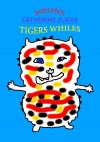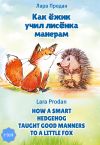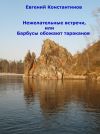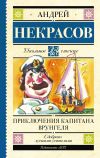Текст книги "Легкое чтение на английском языке. Легенды Нового Света / North American Indian Legends"
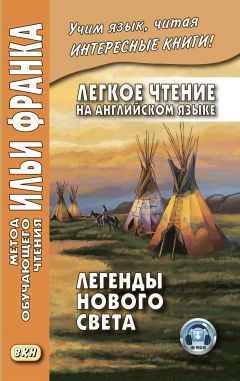
Автор книги: Сборник
Жанр: Иностранные языки, Наука и Образование
Возрастные ограничения: +12
сообщить о неприемлемом содержимом
Текущая страница: 2 (всего у книги 7 страниц) [доступный отрывок для чтения: 2 страниц]
How the Toad and Porcupine Lost their Noses
(Как Жаба и Дикобраз потеряли свои носы[1]1
To lose.
[Закрыть])
In the old time (в былые времена: «в старое время»), far before men knew themselves (задолго до того, как люди узнали = осознали себя), in the light before the sun (в свете до солнца = когда еще не было солнечного света), Glooskap and his brother were as yet unborn (Глускап и его брат были также еще не рождены); they waited for the day to appear (они ждали дня, чтобы появиться). Then they talked together (тогда они беседовали вместе), and the youngest said (и младший сказал), “Why should I wait (почему я должен ждать)? I will go into the world (я пойду в мир) and begin my life at once (и начну мою жизнь немедленно; at once – сразу, немедленно).” Then the elder said (тогда старший сказал), “Not so, for this were a great evil (не так = не стоит так поступать, ибо это было бы великим злом).” But the younger gave no heed to any wisdom (но младший не обратил /никакого/ внимания на мудрость = мудрые слова; to give heed to smth. – обращать внимание на что-либо); in his wickedness he broke through his mother's side (в своей злобе = упорстве он пробился сквозь бок своей матери; to break – ломать; to break through – пробить/ся/; wicked – злой; безнравственный), he rent the wall (он разорвал преграду; to rend; wall – стена); his beginning of life was his mother's death (начало его жизни было = стало смертью его матери).
appear [ǝ'pɪǝ], talk [tɔ:k], world [wɜ:ld], once [wʌns], evil ['i:vl], wisdom ['wɪsd(ǝ)m], wicked ['wɪkɪd]
In the old time, far before men knew themselves, in the light before the sun, Glooskap and his brother were as yet unborn; they waited for the day to appear. Then they talked together, and the youngest said, “Why should I wait? I will go into the world and begin my life at once.” Then the elder said, “Not so, for this were a great evil.” But the younger gave no heed to any wisdom; in his wickedness he broke through his mother's side, he rent the wall; his beginning of life was his mother's death.
Now, in after years (так вот, впоследствии; in after years – впоследствии), the younger brother would learn (младший брат захотел узнать) in what lay the secret of the elder's death (в чем лежал = был секрет смерти старшего). And Glooskap, being crafty (и Глускап, будучи хитроумным; craft – ремесло; ловкость, умение, искусство; сноровка), told the truth and yet lied (сказал правду и все же солгал; to tell); for his name was the Liar (ибо имя ему было Обманщик), yet did he never lie for evil (однако никогда он не лгал ради зла) or aught to harm (или чего-либо, что могло навредить). So he told his brother (итак, он сказал своему брату) that the blow of a ball (что удар клубком/шариком), or handful of the down of feathers (или пригоршней пуха перьев; down – пух, пушок; перья), would take away his life (отнимет у него жизнь; to take away – забрать, отнять); and this was true (и это было правдиво = правдой), for it would stun him (так как это его оглушило бы), but it would not prevent his returning to life (но это не помешало бы его возвращению к жизни). Then Glooskap asked the younger for his own secret (затем Глускап спросил младшего о его собственном секрете = о секрете младшего брата). And he, being determined to give the elder no time (и он, будучи настроенным не дать старшему времени; to determine – определять, устанавливать; решать), answered truly and fearlessly (ответил честно и бесстрашно), “I can only be slain by the stroke of a cat-tail or bulrush (меня можно лишить жизни только ударом рогоза или камыша = только стукнув рогозом или камышом; to slay – убивать, уничтожать, лишать жизни).”
secret ['si:krɪt], crafty ['krɑ:ftɪ], liar ['laɪǝ], feather ['feðǝ], true [tru:], determine [dɪ'tɜ:mɪn]
Now, in after years, the younger brother would learn in what lay the secret of the elder's death. And Glooskap, being crafty, told the truth and yet lied; for his name was the Liar, yet did he never lie for evil or aught to harm. So he told his brother that the blow of a ball, or handful of the down of feathers, would take away his life; and this was true, for it would stun him, but it would not prevent his returning to life. Then Glooskap asked the younger for his own secret. And he, being determined to give the elder no time, answered truly and fearlessly, “I can only be slain by the stroke of a cat-tail or bulrush.”
And then the younger (и тогда младший), having gathered the down of bird's feathers (насобирав пуха птичьих перьев), struck the elder (ударил /им/ старшего; to strike), so that he fell dead (так что тот упал мертвый = замертво; to fall), and therein he told the truth (и тем самым он /старший/ сказал правду; therein – здесь, там, в этом, в том; в этом отношении). But he soon recovered (но он вскоре оправился/пришел в себя; to recover – вновь обретать; возвращать, получать обратно), and in that was his deceit (и в этом был его обман). Howbeit it was well for the world and well for him (как бы то ни было, удачно было для мира и удачно для него) that he then gathered bulrushes (что затем он насобирал камышей) and smote his younger brother (и ударил своего младшего брата; to smite – ударять, бить), so that he died (так, что тот умер). But the plant never grew that could harm the Master (но так и не выросло растение, что могло бы поразить Хозяина), wherefore he is alive to this day (поэтому он жив до сих пор: «до этого дня»).
gather ['ɡæðǝ], dead [ded], therein [ðeǝr'ɪn], truth [tru:θ], recover [rɪ'kʌvǝ], deceit [dɪ'si:t], plant [plɑ:nt]
And then the younger, having gathered the down of bird's feathers, struck the elder, so that he fell dead, and therein he told the truth. But he soon recovered, and in that was his deceit. Howbeit it was well for the world and well for him that he then gathered bulrushes and smote his younger brother, so that he died. But the plant never grew that could harm the Master, wherefore he is alive to this day.
Who was his mother (кем была его мать)? The female Turtle was his mother (его мать была Черепахой; female – женский, /особа/ женского пола; самка).
The Master was the Lord of Men and Beasts (Хозяин был Господином Людей и Животных/Зверей). Beasts and Men, one as the other (Животными и Людьми, одними, как другими = и первыми, и вторыми), he ruled them all (он правил ими всеми). Great was his army (велика была его армия), his tribe was All (/и/ народом его были Все). In it the Great Golden Eagle was a chief (в нем /в этом народе/ Великий Золотой Орел был вождем); he married a female Caribou (он взял в жены женщину-Карибу[2]2
Caribou – северный канадский олень, карибу; в мифологии индейцев животные наделялись человеческими качествами и подчас не проводилось границы между народом людей и народом животных, которых иногда называли просто – people (люди).
[Закрыть]). The Turtle was Glooskap's uncle (Черепаха приходился Глускапу дядей); he married a daughter of the Golden Eagle and Caribou (он взял в жены дочь Золотого Орла и Карибу). Of all these things there are many and long traditions (от всех этих существ и /пошли/ многочисленные старинные традиции; long tradition – давняя, старинная традиция). Our people tell them in the winter by the fire (наш народ рассказывает их зимой у огня); the old people know them (старики: «старые люди» знают их); the young forget them and the wisdom which is in them (молодые забывают их и ту мудрость, которая /заключена/ в них).
female ['fi:meɪl], turtle ['tɜ:tl], master ['mɑ:stǝ], daughter ['dɔ:tǝ], caribou ['kærɪbu:], tradition [trǝ'dɪʃ(ǝ)n]
Who was his mother? The female Turtle was his mother.
The Master was the Lord of Men and Beasts. Beasts and Men, one as the other, he ruled them all. Great was his army, his tribe was All. In it the Great Golden Eagle was a chief; he married a female Caribou. The Turtle was Glooskap's uncle; he married a daughter of the Golden Eagle and Caribou. Of all these things there are many and long traditions. Our people tell them in the winter by the fire; the old people know them; the young forget them and the wisdom which is in them.
When the Turtle married (когда Черепаха женился), the Master bade him make a feast (Хозяин повелел ему собрать: «сделать» пир), and wished that the banquet should be a mighty one (и пожелал, чтобы застолье было громадным; mighty – большой, громадный; might – мощь). To do this he gave him great power (чтобы сделать это, он наделил его великой силой). He bade him go down to a point of rocks by the sea (он приказал ему пойти вниз на скалистый мыс у моря; point – мыс, выступающая морская коса; to bid – приказывать; просить), where many whales were always to be found (где всегда можно было найти много китов). He bade him bring one (он повелел ему принести одного); he gave him power to do so (он дал ему силу сделать так = это), but he set a mark, or an appointed space (но он установил границу, или обозначенное пространство), and bade him not go an inch beyond it (и приказал ему не выходить ни на дюйм за него). So the Turtle went down to the sea (итак, Черепаха пошел вниз = спустился к морю); he caught a great whale (он поймал огромного кита; to catch), he bore it to camp (он принес его на место привала/стоянки; to bear; camp – лагерь, бивак, место стоянки); it seemed to him easy to do this (ему показалось легко сделать это = что это было легко). But like all men there was in him vain curiosity (но, как и во всех людях, было в нем пустое любопытство; vain – напрасный, бесполезный, тщетный; поверхностный, пустой); the falsehood of disobedience was in him (вероломство неповиновения было в нем; false – неверный, ошибочный; фальшивый, неискренний, притворный; obedient – покорный, послушный, готовый подчиняться), and to try the Master he went beyond the mark (и, чтобы испытать Хозяина, он зашел за границу = переступил границу); and as he did this he lost his magic strength (и когда он сделал это, он потерял свою волшебную силу; to lose); he became as a man (он стал как человек; to become); even as a common mortal (даже как простой смертный) his nerves weakened (его силы ослабли; nerve – нерв; мускул, сухожилие; weak – слабый), and he fell, crushed flat beneath the weight of the great fish (и он упал, раздавленный весом: «под весом» огромной рыбины; to fall; to crush – давить; мять/ся/; flat – плоский).
banquet ['bæŋkwɪt], appoint [ǝ'pɔɪnt], power ['paʋǝ], whale [weɪl], beyond [bɪ'jɒnd], magic ['mæʤɪk], mortal ['mɔ:t(ǝ)l], common ['kɒmǝn]
When the Turtle married, the Master bade him make a feast, and wished that the banquet should be a mighty one. To do this he gave him great power. He bade him go down to a point of rocks by the sea, where many whales were always to be found. He bade him bring one; he gave him power to do so, but he set a mark, or an appointed space, and bade him not go an inch beyond it. So the Turtle went down to the sea; he caught a great whale, he bore it to camp; it seemed to him easy to do this. But like all men there was in him vain curiosity; the falsehood of disobedience was in him, and to try the Master he went beyond the mark; and as he did this he lost his magic strength; he became as a man; even as a common mortal his nerves weakened, and he fell, crushed flat beneath the weight of the great fish.
Then men ran to Glooskap, saying that Turtle was dead (тогда люди побежали к Глускапу, говоря, что Черепаха мертв; to run). But the Master answered (но Хозяин ответил), “Cut up the Whale; he who is now dead will revive (разрежьте Кита; он = тот, кто сейчас мертв, оживет).” So they cut it up (итак, они его разрезали); (and when the feast was ready (и когда пир был готов)) Turtle came in yawning (Черепаха вошел, зевая; to come in – входить), and stretching out his leg he cried (и, растягивая ногу = потягиваясь, он объявил; to stretch out – растягивать; to cry – кричать, объявлять, оглашать, восклицать), “How tired I am (как я устал: «какой я уставший»)! Truly, I must have overslept myself (в самом деле, я, должно быть, проспал; to oversleep – проспать, заспаться /тж. oversleep oneself/).” Now from this time all men greatly feared Glooskap (и вот, с тех пор все люди очень боялись Глускапа; now – /и/ вот /в нач. предлож./), for they saw that he was a spirit (ведь они поняли, что он был не человек: «дух»; to see – видеть; понимать, сознавать; spirit – дух, привидение, призрак).
turtle ['tɜ:tl], revive [rɪ'vaɪv], feast [fi:st], ready ['redɪ], yawn [jɔ:n], fear [fɪǝ], spirit ['spɪrɪt]
Then men ran to Glooskap, saying that Turtle was dead. But the Master answered, “Cut up the Whale; he who is now dead will revive.” So they cut it up; (and when the feast was ready) Turtle came in yawning, and stretching out his leg he cried, “How tired I am! Truly, I must have overslept myself.” Now from this time all men greatly feared Glooskap, for they saw that he was a spirit.
It came to pass (случилось /так/) that the Turtle waxed mighty in his own conceit (что Черепаха чрезвычайно возвысился в собственном самомнении; to wax – /уст./ увеличиваться, расти; mighty – весьма, сильно, чрезвычайно), and thought that he could take Glooskap's place and reign in his stead (и подумал, что он мог /бы/ занять место Глускапа и править за него; stead – место /место или позиция лица, вещи и т. п., которое замещается другим лицом, вещью и т. п./). So he held a council of all the animals (поэтому он созвал совет всех животных; to hold a council – созвать, провести: «держать» совет) to find out how he could be slain (чтобы узнать, как он мог /бы/ быть повержен; to find out – выяснить, понять, разузнать; to slay /slew, slain/ – убивать, уничтожать, лишать жизни). The Lord of Men and Beasts laughed at this (Господин Людей и Зверей рассмеялся над этим). Little did he care for them (/как/ мало они его волновали; to care for smth. – заботиться о чем-либо)!
pass [pɑ:s], wax [wæks], conceit [kǝn'si:t], reign [reɪn], stead [sted], council ['kaʋnsl], laugh [lɑ:f]
It came to pass that the Turtle waxed mighty in his own conceit, and thought that he could take Glooskap's place and reign in his stead. So he held a council of all the animals to find out how he could be slain. The Lord of Men and Beasts laughed at this. Little did he care for them!
And knowing all that was in their hearts (и, зная все, что было в их сердцах), he put on the shape of an old squaw (он принял облик старой скво) and went into the council-house (и вошел в дом совета = в дом, где проходило заседание совета). And he sat down by two witches (и он сел рядом с двумя ведьмами; to sit down): one was the Porcupine (одна была Дикобраз), the other the Toad (другая – Жаба); as women they sat there (в облике женщин: «как женщины» они сидели там). Of them the Master asked humbly how they expected to kill him (их Хозяин спросил кротко, как они надеялись убить его; humble – покорный, смиренный; скромный; to expect – ожидать; надеяться, предполагать). And the Toad answered savagely (и Жаба ответила грубо; savage – дикий /находящийся в первобытном состоянии, не подвергшийся воздействию человека/; грубый), “What is that to thee (что тебе до этого), and what hast thou to do with this thing (и какое отношение ты имеешь к этому; hast – /уст./ 3-е л. ед. ч. от to have; to have to do with smth. – /разг./ иметь какое-то отношение к чему-либо)?”
heart [hɑ:t], squaw [skwɔ:], women ['wɪmɪn], answer ['ɑ:nsǝ], savagely ['sævɪʤlɪ], thou [ðaʋ]
And knowing all that was in their hearts, he put on the shape of an old squaw and went into the council-house. And he sat down by two witches: one was the Porcupine, the other the Toad; as women they sat there. Of them the Master asked humbly how they expected to kill him. And the Toad answered savagely, “What is that to thee, and what hast thou to do with this thing?”
“Truly (в самом деле),” he replied (ответил он; to reply), “I meant no harm (я не имел в виду ничего плохого; to mean; harm – вред, ущерб),” and saying this he softly touched the tips of their noses (и, говоря так, он слегка дотронулся до кончиков их носов; soft – мягкий, приятный), and rising went his way (и, поднявшись, пошел по своим делам; to go one's way; way – путь; сторона). But the two witches, looking one at the other (но две ведьмы, глядя друг на друга), saw presently that their noses were both gone (увидели теперь, что носы обеих исчезли; both – оба, обе и т. п.; presently – ныне, теперь; некоторое время спустя), and they screamed aloud in terror (и они завизжали громко от ужаса), but their faces were none the less flat (но их лица остались, тем не менее, плоскими). And so it came (и так получилось; to come – зд. наступать, случаться, происходить) that the Toad and the Porcupine both lost their noses (что Дикобраз и Жаба потеряли свои носы) and have none to this day (и не имеют /их/ до сего дня; none – никто, ничто; ничего и т. п.)
reply [rɪp'laɪ], harm [hɑ:m], noses ['nǝʋzɪz], aloud [ǝ'laʋd], both [bǝʋθ], none [nʌn]
“Truly,” he replied, “I meant no harm,” and saying this he softly touched the tips of their noses, and rising went his way. But the two witches, looking one at the other, saw presently that their noses were both gone, and they screamed aloud in terror, but their faces were none the less flat. And so it came that the Toad and the Porcupine both lost their noses and have none to this day.
Glooskap had two dogs (у Глускапа были две собаки). One was the Loon (одну звали Гагара), the other the Wolf (другую – Волк). Of old all animals were as men (в прежнее время все животные были как люди; of old – в прежние времена); the Master gave them the shapes which they now bear (Хозяин даровал им те тела, которые они имеют сейчас; shape – форма, образ; to bear – носить). But the Wolf and the Loon loved Glooskap so greatly (но Волк и Гагара любили Глускапа так сильно) that since he left them they howl and wail (что с тех пор, как он покинул их, они плачут и воют/вопят; to leave – покидать, оставлять). He who hears their cries over the lonely lake (тот, кто слышит их плач над пустынным озером; still – тихий, безмолвный), by the streams where no dwellers are (у рек, где никто не живет; dweller – обитатель, житель; to dwell – проживать), or afar at night in the forests and hollows (или далеко в ночи в лесах и низинах; hollow – полость, пустое пространство; впадина; низина, ложбина), hears them sorrowing for the Master (слышит, как они тоскуют по Хозяину; to sorrow for smb. – тосковать по кому-либо, горевать о ком-либо).
shape [ʃeɪp], loon [lu:n], lonely ['lǝʋnlɪ], sorrow ['sɒrǝʋ]
Glooskap had two dogs. One was the Loon, the other the Wolf. Of old all animals were as men; the Master gave them the shapes which they now bear. But the Wolf and the Loon loved Glooskap so greatly that since he left them they howl and wail. He who hears their cries over the lonely lake, by the streams where no dwellers are, or afar at night in the forests and hollows, hears them sorrowing for the Master.
The Meeting of the Wild Animals
(Совет/Собрание диких зверей)
A long time ago, when the Tsimshian lived on the upper Skeena River (очень давно, когда племя цимшиан обитало в верховьях Скины: «на верхней реке Скина»; a long time ago – очень давно), in Prairie Town (в Городе Прерий), there were many people (было много людей). They were the most clever and the strongest among all the people (они были самыми умными и самыми сильными среди всех людей), and they were good hunters (и они были хорошими охотниками), and caught many animals (и ловили много зверей; to catch), going hunting the whole year round (занимаясь охотой круглый год; to go doing smth. – заниматься чем-либо). Therefore all the animals were in great distress on account of the hunters (поэтому все животные были очень несчастны из-за этих охотников; distress – горе, несчастье; on account of – /разг./ по причине, из-за, потому что; account – счет; основание, причина).
ago [ǝ'ɡǝʋ], prairie ['preǝrɪ], among [ǝ'mʌŋ], caught [kɔ:t], round [raʋnd], therefore ['ðeǝfɔ:], animal ['ænɪm(ǝ)l], account [ǝ'kaʋnt]
A long time ago, when the Tsimshian lived on the upper Skeena River, in Prairie Town, there were many people. They were the most clever and the strongest among all the people, and they were good hunters, and caught many animals, going hunting the whole year round. Therefore all the animals were in great distress on account of the hunters.
Therefore the animals held a meeting (поэтому животные собрали совет; to hold – держать). The Grizzly Bear invited all the large animals to his house (Медведь Гризли пригласил всех больших зверей к себе домой), and said to them (и сказал им), “We are distressed, and a calamity has befallen us (мы несчастны, и горе выпало на нашу долю; to distress – причинять страдание, горе; мучить, терзать; to befall – выпасть /на долю/ кому-либо) on account of the hunting of these people (из-за охоты этих людей), who pursue us into our dens (которые загоняют нас в наши берлоги; to pursue – преследовать кого-либо, гнаться за кем-либо). Therefore it is in my mind to ask Him Who Made Us (поэтому я хочу попросить Того-Кто-Создал-Нас; mind – разум, ум) to give us more cold in winter (дать нам больше холода зимой), so that no hunter may come and kill us in our dens (так чтобы никакой охотник /не/ мог прийти и убить нас в наших убежищах). Let Him Who Made Us give to our earth severe cold (пусть Тот-Кто-Создал-Нас даст нашей земле жестокий холод; severe – суровый)!”
meeting ['mi:tɪŋ], distress [dɪs'tres], calamity [kǝ'læmɪtɪ], therefore ['ðeǝfɔ:], mind [maɪnd], severe [sɪ'vɪǝ]
Therefore the animals held a meeting. The Grizzly Bear invited all the large animals to his house, and said to them, “We are distressed, and a calamity has befallen us on account of the hunting of these people, who pursue us into our dens. Therefore it is in my mind to ask Him Who Made Us to give us more cold in winter, so that no hunter may come and kill us in our dens. Let Him Who Made Us give to our earth severe cold!”
Thus spoke the Grizzly Bear to his guests (так говорил Медведь Гризли своим гостям; to speak). Then all the large animals agreed to what the chief had said (тогда все крупные звери согласились с тем, что сказал вождь), and the Wolf spoke (и Волк заговорил): “I have something to say (я хочу: «имею» кое-что сказать). Let us invite all the small animals (давайте пригласим всех маленьких зверей), – even such as Porcupine (даже таких, как Дикобраз), Beaver (Бобер), Raccoon (Енот), Marten (Куница), Mink (Норка), down to the small animals such as the Mouse (вплоть до таких маленьких, как Мышь; down to – зд. вплоть, до конца), and the Insects that move on the earth (и Насекомых, что ползают: «двигаются» по земле), – for they might come forth and protest against us (ведь они могут выступить против нас; to come forth – выйти, выступить вперед), and our advice might come to nought (и наше просьба может пропасть впустую; advice – совет, рекомендация; to come to nought – сойти на нет; не иметь /никакого/ успеха; nought – ничто)!” Thus spoke the large Wolf to the large animals in their council (так говорил большой Волк /другим/ большим животным на собрании/совете).
bear [beǝ], guest [ɡest], wolf [wʋlf], porcupine ['pɔ:kjʋpaɪn], raccoon [rǝ'ku:n], nought [nɔ:t]
Thus spoke the Grizzly Bear to his guests. Then all the large animals agreed to what the chief had said, and the Wolf spoke: “I have something to say. Let us invite all the small animals, – even such as Porcupine, Beaver, Raccoon, Marten, Mink, down to the small animals such as the Mouse, and the Insects that move on the earth, – for they might come forth and protest against us, and our advice might come to nought!” Thus spoke the large Wolf to the large animals in their council.
Therefore on the following day the large animals assembled on an extensive prairie (поэтому на следующий день большие животные собрались на широкой равнине; extensive – протяженный), and they called all the small animals, down to the insects (и они позвали всех маленьких зверей, вплоть до насекомых); and all the small animals and the insects assembled and sat down on one side of the plain (и все маленькие животные и насекомые собрались и сели на одном конце равнины; side – сторона, бок, край), and the large animals were sitting on the other side of the plain (а большие звери сидели на другом конце равнины). Panther came (пришла Пантера), Grizzly Bear (Медведь Гризли), Black Bear (Черный Медведь[3]3
Cевероамериканский черный медведь, называемый индейцами «мусква».
[Закрыть]), Wolf (Волк), Elk (Лось), Reindeer (Северный Олень), Wolverene (Росомаха; wolverene = wolverine) – all kinds of large animals (все виды больших животных; kind – вид, род, класс; /уст./ род, семейство).
assemble [ǝ'sembl], extensive [ɪk'stensɪv], panther ['pænθǝ], reindeer ['reɪndɪǝ], wolverene ['wʋlvǝri:n], large [lɑ:ʤ]
Therefore on the following day the large animals assembled on an extensive prairie, and they called all the small animals, down to the insects; and all the small animals and the insects assembled and sat down on one side of the plain, and the large animals were sitting on the other side of the plain. Panther came, Grizzly Bear, Black Bear, Wolf, Elk, Reindeer, Wolverene – all kinds of large animals.
Then the chief speaker, Grizzly Bear, arose, and said (тогда главный оратор, Медведь Гризли, встал и сказал; to arise), “Friends, I will tell you about my experiences (друзья, я расскажу вам о том, что случилось; experience – случай, событие, происшествие;ср. to tell about one's experiences = to share an experience – рассказать какой-нибудь случай из жизни, поделиться опытом).” Thus he spoke to the small animals and to the insects (так говорил он маленьким животным и насекомым). “You know very well how we are afflicted by the people (вы знаете очень хорошо, как наc беспокоят люди; to afflict – беспокоить, задевать, огорчать) who hunt us on mountains and hills (которые охотятся на нас в горах и /на/ холмах), even pursuing us into our dens (даже следуют /неотступно/ за нами в наши убежища; to pursue – следовать неотступно, гнаться за кем-либо, преследовать). Therefore, my brothers, we have assembled (поэтому, братья мои, мы собрались /вместе/) (he meant the large animals (он имел в виду больших животных; to mean – иметь в виду)). On the previous day I called them all (накануне я их всех созвал; previous – предыдущий, предшествующий), and I told them what I had in my mind (и рассказал им, что у меня было на уме).
experience [ɪks'pɪǝrɪǝns], insect ['ɪnsekt], afflict [ǝ'flɪkt], pursue [pǝ'sju:], meant [ment], previous ['pri:vɪǝs]
Then the chief speaker, Grizzly Bear, arose, and said, “Friends, I will tell you about my experiences.” Thus he spoke to the small animals and to the insects. “You know very well how we are afflicted by the people who hunt us on mountains and hills, even pursuing us into our dens. Therefore, my brothers, we have assembled (he meant the large animals). On the previous day I called them all, and I told them what I had in my mind.
I said, 'Let us ask Him Who Made Us to give to our earth cold winters (давайте попросим Того-Кто-Создал-Нас дать нашей земле холодные зимы), colder than ever (холоднее, чем когда-либо), so that the people who hunt us (так что люди, которые охотятся на нас; so that – /союз/ с тем чтобы; для того чтобы; так что), can not come to our dens and kill us and you (не могли приходить в наши убежища/логова и убивать нас и вас)!' and my brothers agreed (и мои братья согласились). Therefore we have called you (поэтому мы позвали вас), and we tell you about our council (и мы сообщаем вам о нашем совещании).” Thus spoke the Grizzly Bear (так говорил Гризли). Moreover, he said (более того, он сказал), “Now I will ask you, large animals, is this so (теперь я спрашиваю вас, большие звери, правда ли это: «это так»)?”
earth [ɜ:θ], agree [ɜ:'ɡri:], thus [ðʌs], moreover [mɔ:r'ǝʋvǝ], so [sǝʋ]
I said, 'Let us ask Him Who Made Us to give to our earth cold winters, colder than ever, so that the people who hunt us can not come to our dens and kill us and you!' and my brothers agreed. Therefore we have called you, and we tell you about our council.” Thus spoke the Grizzly Bear. Moreover, he said, “Now I will ask you, large animals, is this so?”
Then the Panther spoke, and said (тогда заговорила Пантера, и /она/ сказала), “I fully agree to this wise counsel (я полностью согласна с этим мудрым решением; counsel – совет; план действий, тактика поведения),” and all the large animals agreed (и все большие звери согласились). Then the Grizzly Bear turned to the small animals (тогда Гризли повернулся к маленьким зверькам), who were seated on one side of the prairie (которые сидели на одном конце прерии/равнины), and said, “We want to know what you have to say in this matter (мы хотим знать, что вы можете/хотите сказать по этому поводу; matter – тема, вопрос, предмет /обсуждения/).” Then the small animals kept quiet (/но/ маленькие животные молчали; to keep quiet – молчать; to keep – держать/ся/; quiet – тихий), and did not reply to the question (и не отвечали на вопрос).
fully ['fʋlɪ], turn [tɜ:n], seat [si:t], quiet ['kwaɪǝt]
Then the Panther spoke, and said, “I fully agree to this wise counsel,” and all the large animals agreed. Then the Grizzly Bear turned to the small animals, who were seated on one side of the prairie, and said, “We want to know what you have to say in this matter.” Then the small animals kept quiet, and did not reply to the question.
After they had been silent for a while (после того, как они помолчали: «были безмолвны» некоторое время; after – после, за /указ. на следование во времени/; через, спустя /указ. на промежуток времени/; silent – молчаливый, тихий; for a while – в течение некоторого времени; while – промежуток времени), one of their speakers, Porcupine, arose, and said (один из их вождей/ораторов, Дикобраз, встал и сказал; to arise), “Friends, let me say a word or two to answer your question (друзья, позвольте мне сказать /одно/ или два /слова/, чтобы ответить на ваш вопрос). Your counsel is very good for yourselves (ваш план действий очень хорош для вас /самих/; counsel – план действий; совет), for you have plenty of warm fur (ведь у вас есть много теплого меха; plenty of smth. – много, в избытке), even for the most severe cold (даже для самого жестокого холода), but look down upon these little insects (но взгляните на этих маленьких насекомых). They have no fur to warm themselves in winter (у них нет меха, чтобы обогреться зимой); and how can small insects and other small animals obtain provisions (и как могут маленькие насекомые и другие маленькие животные добывать пропитание) if you ask for severe cold in winter (если вы попросите суровых холодов зимой)? Therefore I say this, don't ask for the greatest cold (поэтому я говорю это = вот что: не просите жесточайших холодов).” Then he stopped speaking and sat down (затем он замолчал: «перестал говорить» и сел).
Внимание! Это не конец книги.
Если начало книги вам понравилось, то полную версию можно приобрести у нашего партнёра - распространителя легального контента. Поддержите автора!- ВКонтакте
- РћРТвЂВВВВВВВВнокласснРСвЂВВВВВВВВРєРСвЂВВВВВВВВ
- Telegram
- Viber
Правообладателям!
Данное произведение размещено по согласованию с ООО "ЛитРес" (20% исходного текста). Если размещение книги нарушает чьи-либо права, то сообщите об этом.Читателям!
Оплатили, но не знаете что делать дальше?